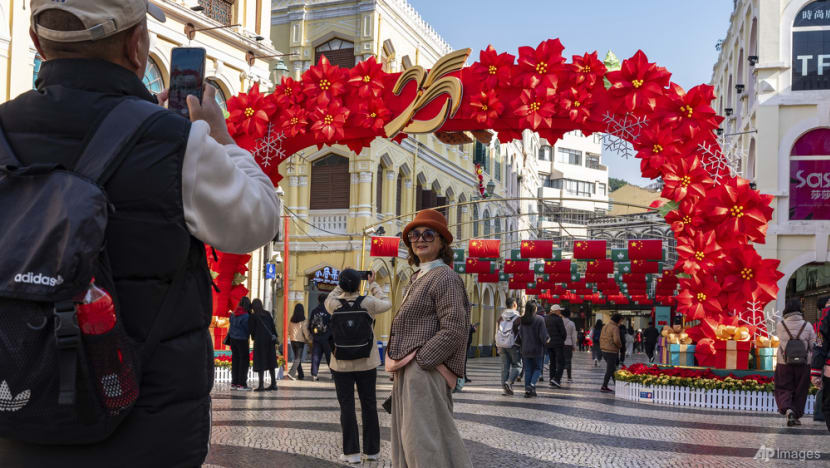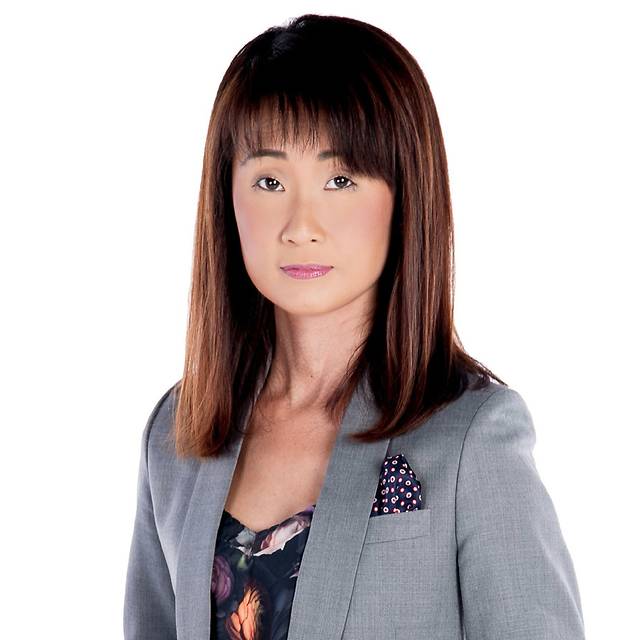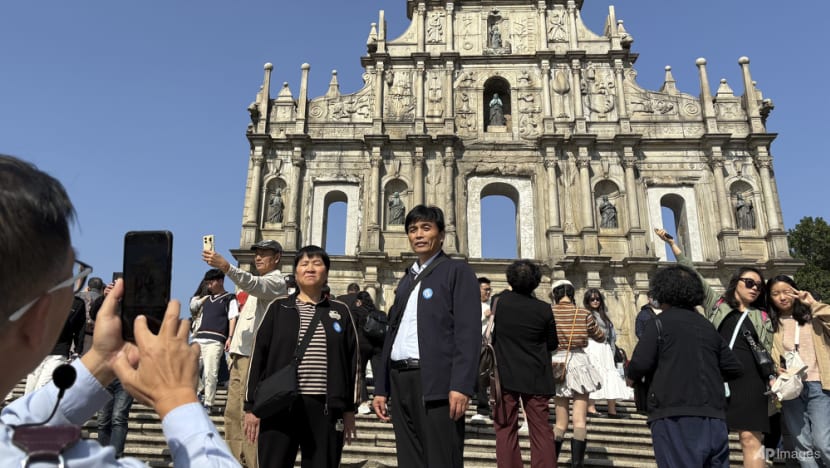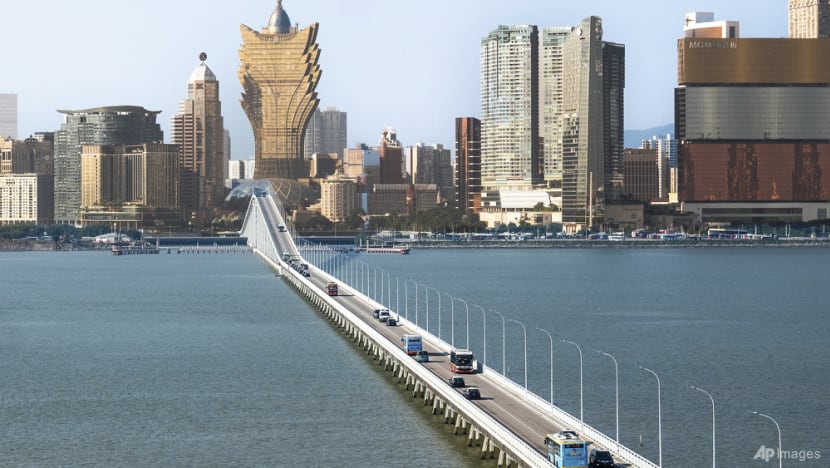Advertisement
Macao, like Hong Kong, has been hailed by Beijing as the exemplary child of its “one country, two systems” style of governance.

Visitor poses for a photo at the Senado Square with Chinese national and Macao flags, ahead of celebrations for the 25th anniversary of Macao’s handover to Chinese rule, in Macao, Thursday, Dec. 19, 2024. (AP Photo/Anthony Kwan)
New: You can now listen to articles. 
This audio is generated by an AI tool.


20 Dec 2024 09:37AM
MACAO: Macao native Yuen Tin Yau has been handmaking and selling the traditional dragon’s beard candy for more than 40 years.
The 77-year-old remains proud of his product, which is made of maltose and flour with fillings like peanuts and sesame. The snack has been inscribed on the list of Macao’s Intangible Cultural Heritage since 2020.
But the elderly owner of Yau Kei Candy has not found it easy to sustain his business.
“In terms of sales volume, before COVID-19 of course it was so much better. After COVID-19, it went down quite a lot … at least more than 10 per cent,” he told CNA.
This was a result of a dip in the number of tourists to the special Chinese administrative region, which has been looking at how to tackle such challenges.
It comes as the city on Friday (Dec 20) marks 25 years since it returned to China in 1999, after more than 400 years of being ruled by the Portuguese.
TOURIST NUMBERS FELL DURING COVID PERIOD
According to the Macao Tourism Office, visitors from China, Hong Kong and Taiwan make up the top three markets to the region.
In the first 10 months of this year, more than 20 million Chinese visitors set foot in Macao. But during the height of the pandemic in 2020, the number of such tourists dwindled to just about 5 million.
Renowned largely for its flashy and lucrative casino industry, the former Portuguese colony is fairly unfamiliar to western visitors.
“They need to spread the culture, I think. If other people know the culture, they will be more interested to come here and to meet and see all these beautiful places,” said Italian tourist Pietro Puccio.
Fellow Italian tourist Michael Moreni told CNA he does not gamble but Macao is “really beautiful anyway”.
“So I really recommend to all the people to come to Macao, not just for gambling, but there’s a lot more to discover,” he added.

Macao, like Hong Kong, has been hailed by Beijing as the exemplary child of its “one country, two systems” style of governance. But observers say if it does not transform quickly enough, the city will face even greater challenges in the near future.
As part of China, its economic performance is closely intertwined with Beijing’s growth.
Last month, the International Monetary Fund (IMF) revised its growth this year to 10.6 per cent – down from its previous forecast of 13.9 per cent.
Still, for a region that has a population of about 700,000 and is more than 30 times smaller in land size compared with neighbouring Hong Kong, its post-pandemic economic recovery has been strong.
According to the IMF, its economy grew by almost 81 per cent last year, driven by a surge in export services after China lifted its pandemic restrictions.
ECONOMIC DIVERSIFICATION
Macao’s incoming Chief Executive Sam Hou Fai said he wants to seize the opportunities offered by the Greater Bay Area project to implement economic diversification.
He said Macao has a solid financial foundation to push forward with this, after the city recorded its highest level of fiscal surplus of more than US$76 billion as of September.
Macao and Hong Kong, along with Chinese city Shenzhen and eight other municipalities in Guangdong province, form the Greater Bay Area.
It was established by China in 2019 as part of the country’s national economic development strategy. The megalopolis, with a population of over 86 million people, generated about 11 per cent of China’s gross domestic product (GDP) last year.

Macao wants to transform itself into a technology and innovation hub, with non-gaming ventures to account for 60 per cent of its GDP.
For Macao lawmaker Jose Pereira Coutinho, he wants more non-gaming quality jobs to be created in order to retain local young talent.
With Macao just an hour away by ferry from Hong Kong, many young Macao residents have been lured to the global financial centre to seek better employment and business opportunities.
Chinese President Xi Jinping has urged the two autonomous regions to work closer together and further integrate themselves into China’s broader development plans.
TACKLING SOCIAL INEQUALITY
Coutinho told CNA he also wants stronger policies to be formulated to tackle social inequality.
“We have already seen a huge and increasingly unequal society here since the COVID (pandemic). Inequality is a very important issue to be tackled,” he added.
“We are tackling these issues right now with the government policies such as subsidising, giving direct subsidies to the poor families and the middle-income.”
Social service organisations like Caritas Macau said they foresee more people, especially the elderly and migrant workers, requiring help.
Since the city’s handover to China in 1999, the Macao authorities have been placing strong emphasis on social welfare under the guidance of the Chinese central government.
Caritas, which has been assisting needy residents for more than 40 years, is able to help at least 10,000 people every year with the authorities’ support through services like food bank handouts and elderly care services.
“Macao has 170,000 migrant workers, among them more than 70,000 are non-Chinese speaking. They come from different countries and are deeply in need of our support. Unfortunately, our support to them is very limited,” said Caritas’ secretary-general Paul Pun.
“Basically, there’s no social welfare or financial assistance for them.”
Aside from chasing higher economic growth, some residents believe the authorities should also strive to cultivate a community that will preserve the values and unique culture of Macao – rich with Chinese and Portuguese heritage.
